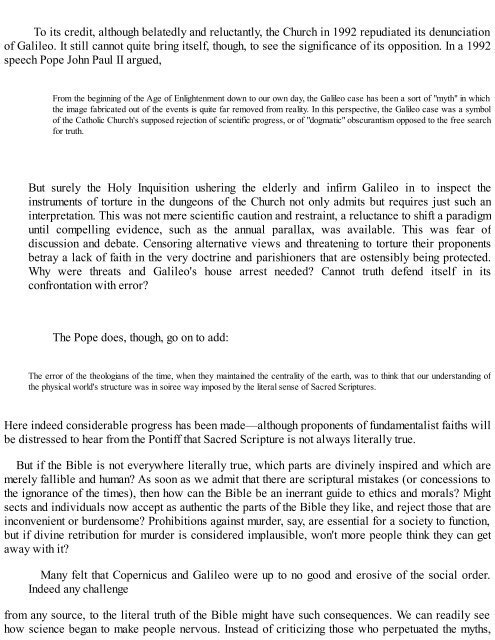Pale Blue Dot ( PDFDrive.com ) (1)
Create successful ePaper yourself
Turn your PDF publications into a flip-book with our unique Google optimized e-Paper software.
To its credit, although belatedly and reluctantly, the Church in 1992 repudiated its denunciation<br />
of Galileo. It still cannot quite bring itself, though, to see the significance of its opposition. In a 1992<br />
speech Pope John Paul II argued,<br />
From the beginning of the Age of Enlightenment down to our own day, the Galileo case has been a sort of "myth" in which<br />
the image fabricated out of the events is quite far removed from reality. In this perspective, the Galileo case was a symbol<br />
of the Catholic Church's supposed rejection of scientific progress, or of "dogmatic" obscurantism opposed to the free search<br />
for truth.<br />
But surely the Holy Inquisition ushering the elderly and infirm Galileo in to inspect the<br />
instruments of torture in the dungeons of the Church not only admits but requires just such an<br />
interpretation. This was not mere scientific caution and restraint, a reluctance to shift a paradigm<br />
until <strong>com</strong>pelling evidence, such as the annual parallax, was available. This was fear of<br />
discussion and debate. Censoring alternative views and threatening to torture their proponents<br />
betray a lack of faith in the very doctrine and parishioners that are ostensibly being protected.<br />
Why were threats and Galileo's house arrest needed? Cannot truth defend itself in its<br />
confrontation with error?<br />
The Pope does, though, go on to add:<br />
The error of the theologians of the time, when they maintained the centrality of the earth, was to think that our understanding of<br />
the physical world's structure was in soiree way imposed by the literal sense of Sacred Scriptures.<br />
Here indeed considerable progress has been made—although proponents of fundamentalist faiths will<br />
be distressed to hear from the Pontiff that Sacred Scripture is not always literally true.<br />
But if the Bible is not everywhere literally true, which parts are divinely inspired and which are<br />
merely fallible and human? As soon as we admit that there are scriptural mistakes (or concessions to<br />
the ignorance of the times), then how can the Bible be an inerrant guide to ethics and morals? Might<br />
sects and individuals now accept as authentic the parts of the Bible they like, and reject those that are<br />
inconvenient or burdensome? Prohibitions against murder, say, are essential for a society to function,<br />
but if divine retribution for murder is considered implausible, won't more people think they can get<br />
away with it?<br />
Many felt that Copernicus and Galileo were up to no good and erosive of the social order.<br />
Indeed any challenge<br />
from any source, to the literal truth of the Bible might have such consequences. We can readily see<br />
how science began to make people nervous. Instead of criticizing those who perpetuated the myths,


